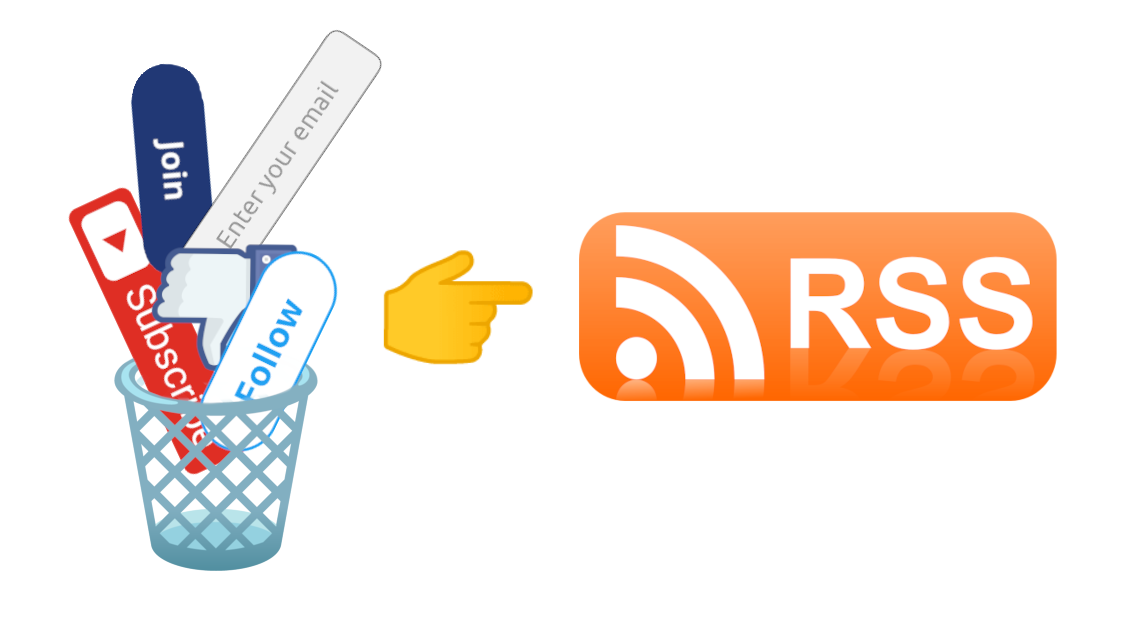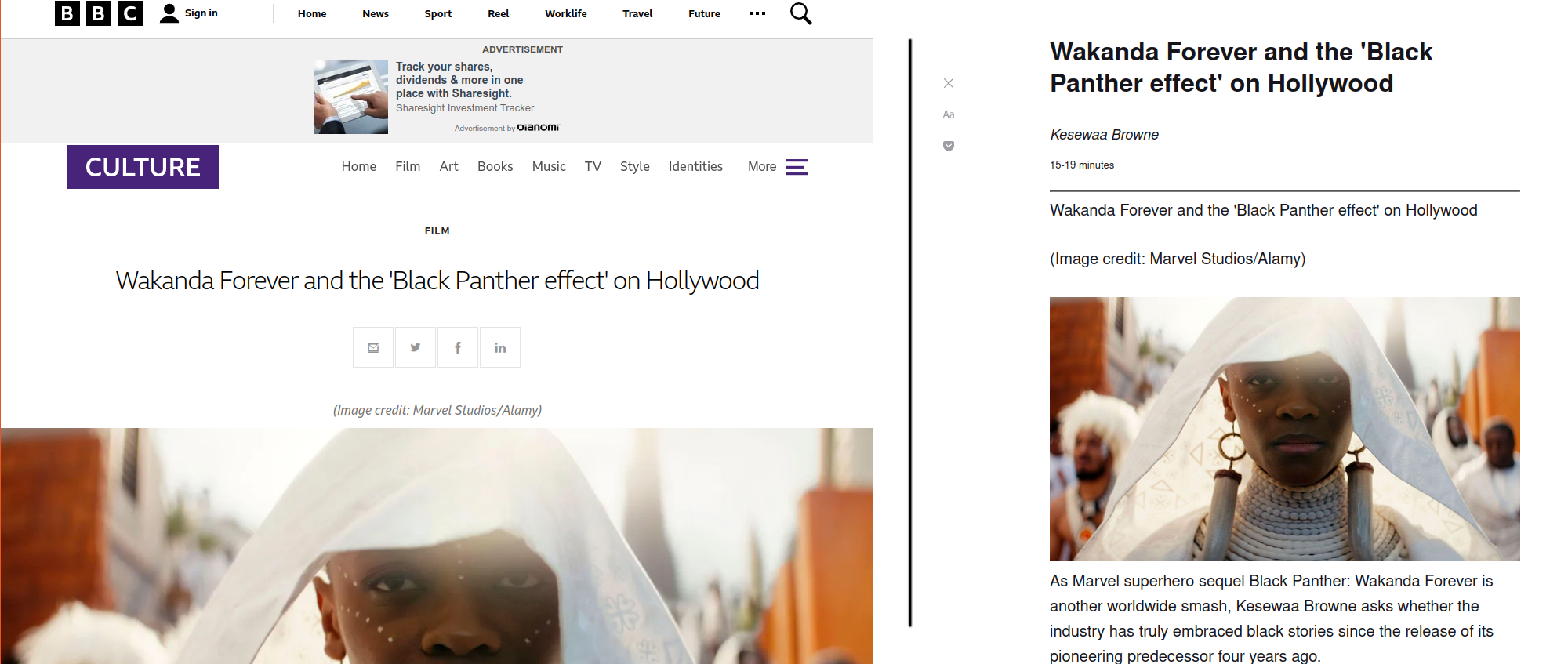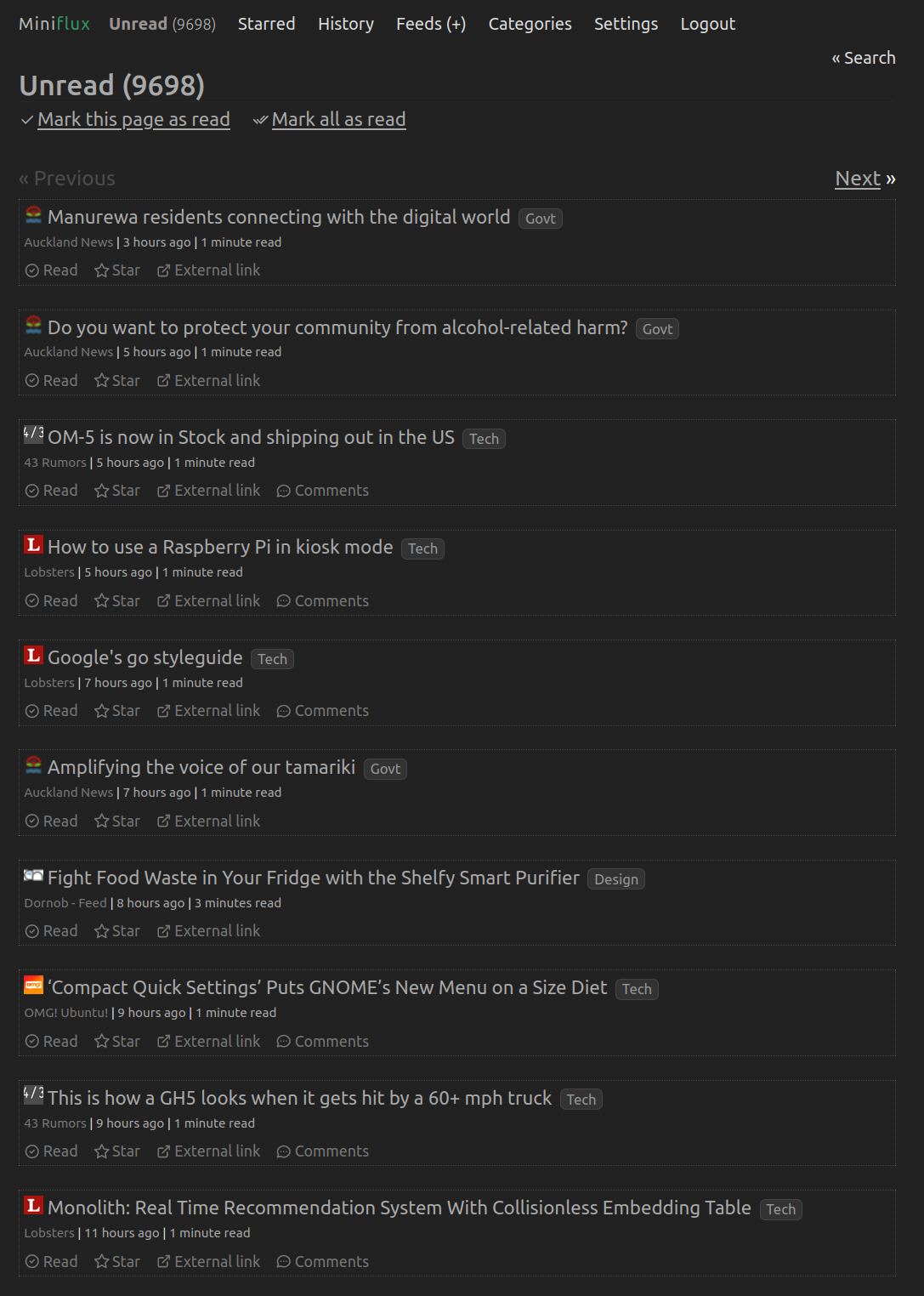A Better way to subscribe - RSS
Anyone looking to escape the clutches of big-tech can use RSS to follow their favorite content and news. Here is why and how.

RSS (Real Simple Syndication) is an ancient web technology which is still used by most sites today. It allows you to subscribe to updates from most websites (or a creator posting on a platform website, such as a YouTube channel or a podcast) in a more private and decentralized manner, with absolute control over what you see and how you see it, free from algorithmic recommendations and without an addiction-inducing interface. If you use your own reader software, you don't even have to create an account nor share any information with anyone.
RSS lets you stay updated and read exactly what you want, your way, un-distracted, bloat-free and all in one place; across all news sites, podcasts, YouTube channels, social media platforms, independent creators and more.
In effect you curate your own feed, instead of having an algorithm (with ulterior motives) do it for you.
With RSS, YOU ARE THE ALGORITHM!
How does this work?
Basically, most sites will have a hidden RSS feed if you add /rss or /feed to the end of its URL.
Some examples of feed URLs:
- https://www.youtube.com/feeds/videos.xml?channel_id=UCAGVTYGccG5ypc0dKL-w4mg
- https://secularbuddhism.com/feed/
- https://lobste.rs/rss
RSS feed URLs allow your device to download a bunch of plain XML data about the articles and updates on that site (often including the full article content, or a summary) and display that data and article content in any way you want. There are many RSS readers out there which can subscribe to these URLs and allow easy distraction-free viewing of the articles. Such software can usually be set up to periodically check for new articles from the URL and notify you.
If you happen to use Firefox browser and want a quick taste of the possible clutter-free reading experience you can achieve, just visit a news site that has RSS and hit the Toggle Reader View button when it appears (or press Ctrl+Alt+R) in the Firefox browser URL bar. Note that Firefox is not a real RSS reader, but it does use the same RSS data to deliver a clutter-free reading experience. The screenshots below are one example of the result:


Extra Reading: Why haven't I heard of RSS before? Why do most sites have this functionality built in, even though they almost never advertise the fact to users? 🤔
Firstly, the main reason popular big-tech, blogs and news sites have RSS feeds is that search engine bots and other website sharing/crawling services need the XML format data in order to know what new pages are added to a site so that they can include them in search results. So essentially, RSS feeds are required for a sites articles to be efficiently indexed by search engine bots. This is part of good SEO - Search Engine Optimization. In many cases the full text of the article is included in the XML, even if the article is behind a paywall. This is why search engines can index some articles behind paywalls... and your RSS reader can actually allow you to read them without paying too!
These days, only tech-savvy folks know about RSS. In the recent decade, Apple, Google, Twitter, even Firefox, and practically every big-tech giant have slowly distanced themselves from RSS publicly, probably due to the loss of control and loss of ad revenue that ensues if it was to be widely used by the mainstream. For example, Google Chrome once had a similar Reader feature to Firefox but it was silently removed. So you can see why most websites do not advertise to users that they have RSS feeds, because it shifts too much control into the users hands. This is why you probably have never heard of RSS... Because Big-tech doesn't want you to know about it.
Another reason tech giants don't want their users subscribing using RSS is that it makes it harder to track what users are doing. They want to know exactly what you read, subscribe to, click on, like and share so that they can continuously shape the user experience to meet their own goals, often creating hidden expense for the user (e.g. distraction and addiction). This can also incentivize creators to essentially create clickbait-ish content in order to get more likes and views - turning the platform into a "look at me!" popularity contest. So they provide buttons on their own site to do all these things conveniently in order to track you. With RSS, they loose much of this tracking capability.
It is important to realize this: Widely used technologies are not necessarily popular because they are any good, but because that's what the powers-that-be WANT you to use.
However, due to the aforementioned requirement for search engine bots, almost all of these giants still have RSS feeds that are technically accessible by any person, often discoverable just by adding /rss to their URLs. Most RSS reader software will be able to discover the feed URL from any sites homepage just by guessing or looking at site metadata, which is probably the same way bots discover it.
Of course, there are also millions of independent sites, like my own, that would very much like you to subscribe to their RSS feed.
👍 Advantages
- Complete control of what you subscribe to
- Complete control of how you view article content (without images/ads, dark mode, any font, any layout etc)
- Distraction-free, clutter-free experience
- No algorithmic recommendations, no incentive to distract you
- Aggregate all subscriptions across all platforms/creators/sites to a single viewing interface
- Some readers allow download of articles for offline viewing
- Potentially improved privacy depending how you set up (if using a local app, no account to create nor share your email)
- Read articles from all your favorite websites with one consistent interface and formatting style.
- As a side-effect, can automatically punch through pay-walls in some cases
👎 Disadvantages
- You are entirely responsible to select and curate your own feed - this takes intial work, and some ongoing maintenance
- There is no algorithm to tell you what to see, so you need to discover feeds and decide everything for yourself
- Some formatting, images, comments, social buttons or other functionality might be lost compared to the original site
- Doesn't work for every site
Options for RSS Reader software
There are many options. I personally prefer open source options. Most of these apps will allow you to subscribe to a site just by entering its base URL (e.g. https://vijayprema.com), and the app will figure out where the feed is located based on site metadata or by guessing.
🌐 Web based readers (require signing up for an account)
- NewsBlur
- Feedly
- Inoreader
- feeder
- The Old Reader
- (You can also sign up for some of the options below, instead of self-hosting)
🤓 Self-hosted readers (run on your own server)
- miniflux (or sign up instead) - personal favourite 👍.
- Fresh RSS (or sign up to a provider instead)
- Feedbin (or sign up instead)
- selfoss (includes its own Android app)
💻 Locally installed reader apps
- Linux, Mac, and Windows - FluentReader, RSS Owl
- Linux Only - NewsFlash
- Android - Nunti
- iOS - ? (I don't use Apple, feel free suggest one)
If you have any suggestions for RSS reader software, let me know. I personally use a self-hosted miniflux instance and I love it:

What if a site doesn't have RSS?
Firstly consider whether the site is actually serving you or distracting you... is the site simply unwise-tech full of distraction and lock-in that you could do without?
If the site genuinely enriches your life, there may be options to extract a feed. Some RSS readers will generate an RSS feed from almost any site even if it doesn't have one. For example, feeder can automatically subscribe to Twitter pages which do not have RSS feeds. Here are some other options regarding Twitter.
There are also separate tools which just generate RSS feed URLs from almost any site, and then you can add that generated feed URL to any RSS reader. These include RSS.app, FetchRSS, or the self-hosted option rss-proxy.
Other wise ways to subscribe?
If RSS doesn't work for you or for an important site, what are other wise-tech options?
A great option is Mastodon, which thanks to the Twitter meltdown, is increasingly available. Simply chose an instance, create an account and start following tags and users you like. No algorithms, no recommendations just whatever you want, minus whatever you don't want (you can filter out posts by keywords and tags!).
Good old email subscriptions can work and you have control over whether you receive it, however it requires sharing your email address and the emails themselves can be riddled with trackers and clickbait, rather than updates in a pure form which you would get through RSS.
Use RSS and be free
So what are you waiting for? Gain freedom from algorithms and big-tech platforms. Live the #undistractedlife. Get an RSS reader app and hit that RSS button at the top right corner of this site (or enter https://vijayprema.com into your reader) and read my work your own way 😎.

